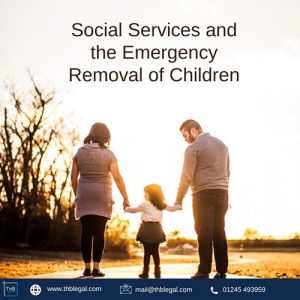Understanding the Basics of Marriage Annulment
Marriage annulment is often misunderstood. Unlike divorce, which ends a legally valid marriage, an...- 19 January 2026
Posted: 07 February 2024
Social Services may be applying to the Court for an Order to protect your child in an emergency. Social Services have duties to protect all children in their area. If they believe your child is at immediate risk of significant harm then they are likely to ask that your child is removed from your care under an Emergency Protection Order.
The Local Authority will need to clear set out the reasons why they think that your child is at risk of immediate significant harm in your care. They will also need to explain the reasons why they believe your child is in immediate danger to justify taking them from their family home urgently. The most common reasons why Social Services state a child is at risk is due to physical abuse, sexual abuse, emotional abuse, neglect or abandonment.

The Court issue an Emergency Protection Order to ensure your child’s safety. The Judge will need to consider whether your child can stay at home or whether they need immediate protection. Often your child will have already come to significant harm at home. Alternatively, it is highly likely that they will come to harm if they are not temporarily removed as a matter of urgency.
You will have the opportunity to respond to the Local Authority’s application for an Emergency Protection Order, usually at Court. We can assist with this process and represent you in Court under free Legal Aid. If you are a parent or have parental responsibility for the child subject to the proceedings.
If an Order is made at Court, then this will come into effect immediately. The Local Authority will ask the police to attend your home and remove your child from your care immediately. Often in the presence of your child’s social worker. If the police cannot locate your child, warrants can be granted to access and search properties where the child could be staying.
It can be considered a criminal offence to obstruct the police in exercising their powers to remove your child. So, it is very important that you do not attempt to obstruct this process. As it can be traumatic for a child to be removed from their parents care particularly if you are in distress. So, if possible, attempt to encourage your child to go with the police, as this often provides them with the reassurance they need. You can explain to your child that you will see them soon. As contact will often be arranged shortly after removal. Even if you do not agree with the making of the Order, it is also helpful to show your child that you can work with professionals and that there is nothing to worry about.
An Emergency Protection Order can last for up to 8 days. The Court can issue an extension of up to 7 days if the Local Authority require more time to investigate and make their decision about whether to issue Care Proceedings. It is likely that the Local Authority will seek to apply for an Interim Care Order during this time. If they feel it is safer for your child to stay away from the family home temporarily.
It is very important to get independent legal advice as soon as you can. Our dedicated team of children’s solicitors will be able to assist throughout the process and represent your interests at Court.
If you have received notice of an Emergency Protection Order then please our specialist Children Law Team immediately. Call 01245 493959 option 3 or by email.
- 19 January 2026
- 17 January 2026
- 13 January 2026